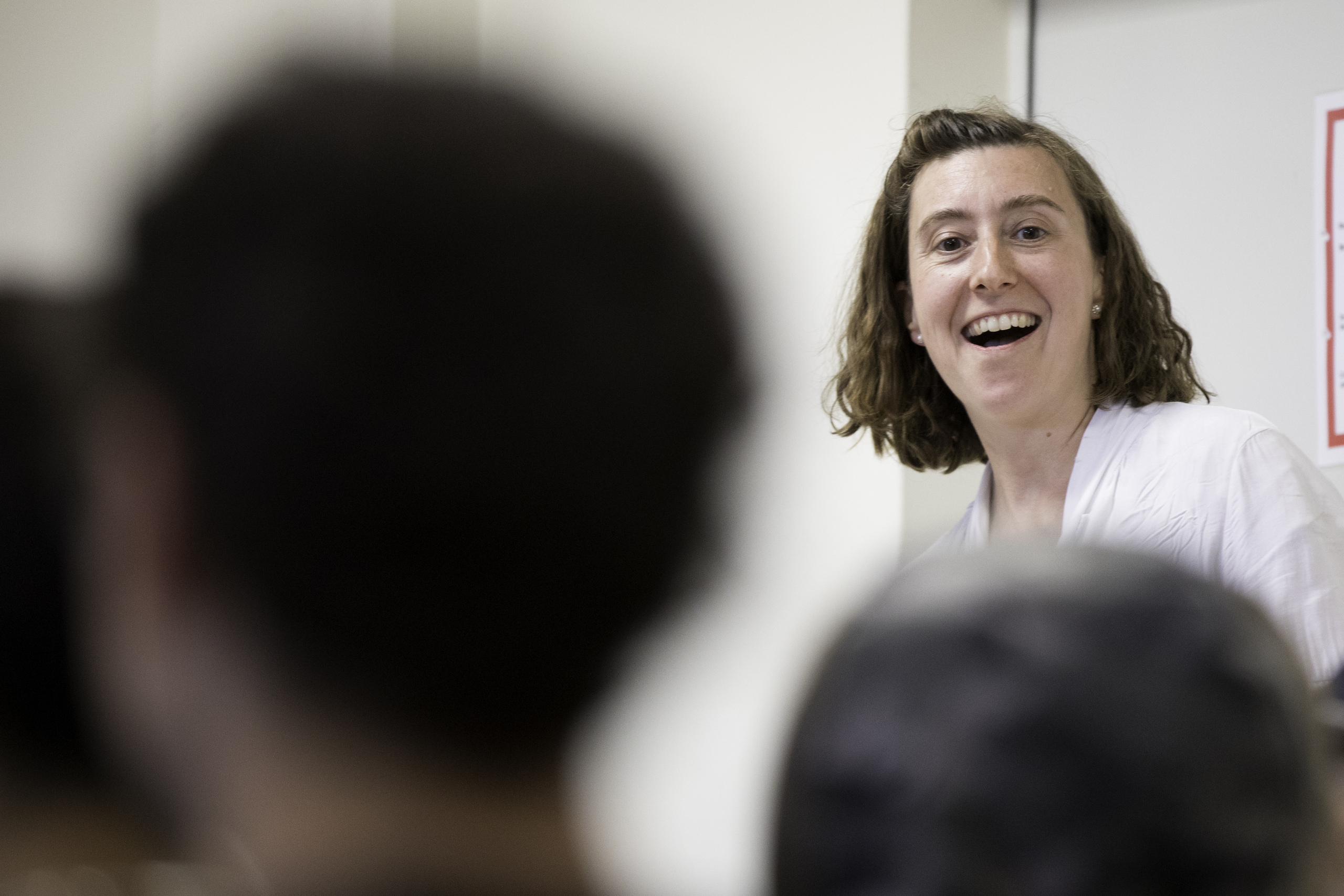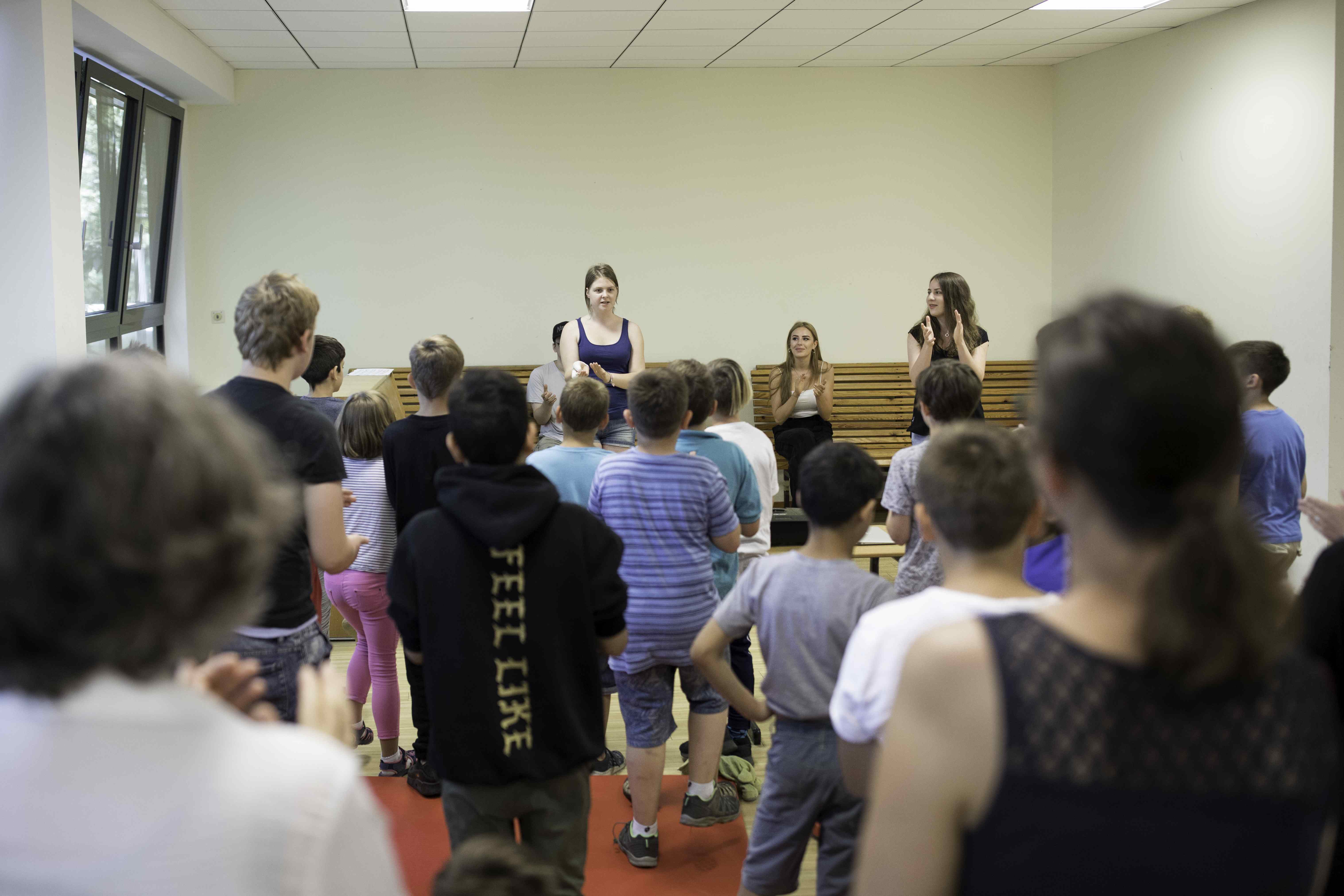Social Impact of Music Making

The Darmstadt Summer Course, which came to an end at the weekend, is about making music, singing, experimenting – and discussing. 450 participants from throughout the world took part in this year’s academy and could be seen and heard at around 50 public concerts. Others met to exchange news on current research projects, such as the “Social Impact of Music Making” cluster at Darmstadt University of Applied Sciences (h_da), organised by Sara Hubrich from the Faculty of Social Work.
By Annette Wannemacher-Saal, 7.8.2025
“Music certainly shapes people.” A short sentence that all the participants of the Darmstadt Summer Course would undoubtedly endorse, regardless of whether they were attending the two-week biennial festival in Darmstadt as composers, instrumentalists or researchers.
The words stem from Viktoria Varkonyi, 35, a Hungarian violinist and music educator from Austria. She travelled to Darmstadt for the closing event of a three-day seminar organised by the research cluster “Social Impact of Music Making” (SIMM) to see what a dozen researchers from around the world have gathered on the topic of “Participatory Opera and Music Theatre Projects.” And according to Varkonyi, who will be organising the next meeting in Vienna in 2027, that’s quite a lot.
“Beacon position” at the university
In Darmstadt this summer, the task fell to Professor Sara Hubrich, an energetic violinist who teaches music in the context of cultural work at the Faculty of Social Work at h_da, a university that generally focuses more on technical subjects. She calls her professorship a “beacon position” because not all universities and social work degree programmes in Germany have such a chair.

The aim is not to teach students a particular instrument in their elective subject. Instead, they should express themselves and develop personally by experiencing, for example, a wide variety of creative activities, such as voice training, making and listening to music, dance theatre, or digital music projects. “It’s great to see what can happen in just a few months.”
They then put this experience into practice in places such as refugee centres, schools, residential groups, or retirement homes, where they listen to, make and compose music, as well as paint, sing and dance with the people there. These shared experiences are oriented towards the participants’ own lives and discussing them is at the heart of this process-based work. New perspectives emerge and the participants muster new courage to tackle their often very challenging circumstances.
Measuring whether something does people good is not so easy
“It evidently does everyone good,” says Sara Hubrich. But the problem is that measuring to what extent and proving it is complex, specific and so multi-layered that it is difficult to produce solid data with a wide reach. Although it is undisputed that “cultural activities have an impact on well-being and social cohesion,” this is often overlooked for the reasons mentioned above. Social workers, organisations and artists find it difficult to communicate the social impact of their projects effectively to “non-experts and political decision-makers.” As a result, says Hubrich, such activities tend to fall victim to budget cuts; projects are scaled back or dropped entirely.
She can corroborate this with a decision by UNESCO. While culture was still included in the draft of the “Pact for the Future” because it contributes to people’s well-being, it was deleted in the 2024 directive – unlike sports, where it is easier to prove successes on the basis of validated scales. So far, there are no comparable methods for measuring impact from music: “It is not yet possible to prove definitively enough that culture is good for society as a whole. But we are working to further advance our research in this area,” she says.
Numerous examples of successful projects around the world
The participants of the research cluster, who reported at their meeting in Darmstadt on their different experiences in their home countries during the closing event at the Schader Foundation on 30 July 2025, were also aware of this. Whether in Australia, Germany, England, France, Greece, Italy, Croatia, the Netherlands or Uruguay, there are plenty of examples of successful projects. One participant learnt during the seminar that her project’s partner school had been awarded the title “Cultural School.”
But there, too, the question arises: Who measures their success, and how can their social impact be made more visible? Is that even necessary? How can the impact of these projects be made known to even more decision-makers and how can even more people with scarcely any access to cultural projects participate in them?
Future funding uncertain – despite successes
Many projects are so successful that they progress by themselves and bring more and more people on board, such as in Friesland, where amateur musicians meet spontaneously in churches to make music. Or in London, where sex workers perform in an opera based on their experiences, with their own compositions and the support of professional musicians? Or in Lisbon, where young offenders stage their own works? Or in Barcelona, where 300 amateurs and 50 professionals run a programme at the Gran Teatre del Liceu that has been so successful that a second one is in the planning? Nevertheless, the question of secure funding remains.
Not all cultural projects are equally expensive, but they all help people to engage with culture. People who are moved and inspired, and discover potential for their own personal development – whether on the stage, behind the scenes, sewing costumes or as lighting technicians. Everyone has talents and aptitudes. You just have to let everyone do what they can, says composer Sean Gregory from Guildhall School of Music and Drama in London. After all, “working together is a human need,” he says.
And when they do this, they feel a sense of social belonging, adds Sara Hubrich. Together with competence and autonomy, these are three components that contribute to well-being – “and this can be measured.” She reports enthusiastically on a project with students in the ninth grade at a school in a disadvantaged suburb of Cologne, which she organised with her colleague Dr Fiona Stevens, also from the Faculty of Social Work.
Sense of community through music
First, the students at the secondary school, of whom 80 percent have a migrant background, got to know the musicians from Concerto Köln in person because, according to Hubrich, building relationships makes a major contribution to the success of these projects. They shared their experiences with music and composed pieces from their own pop and rap songs, which they performed together at the Concerto Köln concert in Wallraf-Richartz Museum and in which Hubrich also took part. In the process, they established a connection to the music they listened to themselves and encountered the music of Concerto Köln. They listened to it together, discussed it, established a relationship with classical music, danced to TikTok posts, and some brought instruments along. Conversations with the school students before and after the project confirmed that “it created a lasting sense of community and a greater sense of well-being.” That was precisely the goal.

Jam sessions in the State Theatre from the autumn onwards
The next project in Darmstadt is already in the starting blocks. Jam sessions at the State Theatre are planned for the autumn, where students from the Music Academy will improvise in tandems with social work students from h_da and various bands. “We don’t know what will happen – but a sense of community will in any case evolve.”
Just one of the colourful ensemble of projects that the participants in the research cluster want to discuss in greater depth in the future. Because they complement each other’s expertise in an expedient and enriching way, the tandems of musicians and social work professionals can make a valuable contribution to promoting these projects and enhancing their visibility. Interdisciplinary dialogue is just as important as ethical reflection, more stringent research methods and proactive institutional reforms, says SIMM initiator Professor Lukas Pairon, summing up. And what about Sara Hubrich as the organiser? She is a little exhausted after the intensive three-day seminar – but more than satisfied with how it went. Here, too, there is no “measurable” result but a constructive dialogue on the different social approaches to music and theatre projects. “Only in this way can we refine our own methods.”
Contact our Science Editorial Team
Christina Janssen
Science Editor
University Communications
Tel.: +49.6151.533-60112
Email: christina.janssen@h-da.de
Translation: Sharon Oranski


